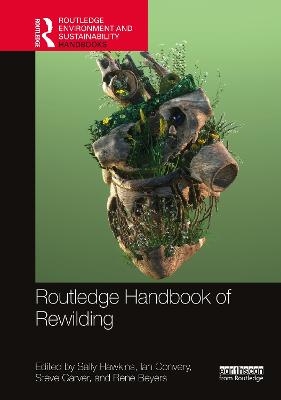
Routledge Handbook of Rewilding
Routledge (Verlag)
978-0-367-56448-3 (ISBN)
This handbook provides a comprehensive overview of the history, theory, and current practices of rewilding.
Rewilding offers a transformational paradigm shift in conservation thinking, and as such is increasingly of interest to academics, policymakers, and practitioners. However, as a rapidly emerging area of conservation, the term has often been defined and used in a variety of different ways (both temporally and spatially). There is, therefore, the need for a comprehensive assessment of this field, and the Routledge Handbook of Rewilding fills this lacuna. The handbook is organised into four sections to reflect key areas of rewilding theory, practice, and debate: the evolution of rewilding, theoretical and practical underpinnings, applications and impacts, and the ethics and philosophy of rewilding. Drawing on a range of international case studies the handbook addresses many of the key issues, including land acquisition and longer-term planning, transitioning from restoration (human-led, nature enabled) to rewilding (nature-led, human enabled), and the role of political and social transformational change.
Led by an editorial team who have extensive experience researching and practising rewilding, this handbook is essential reading for students, academics and practitioners interested in rewilding, ecological restoration, natural resource management and conservation.
Sally Hawkins is an environmental social scientist at the University of Cumbria, UK. She is a core member of the IUCN CEM Rewilding Thematic Group and a founding trustee of the Lifescape Project. Ian Convery is Professor of Environment & Society at the University of Cumbria, co-chairs the IUCN CEM Rewilding Thematic Group, and is chair of IUCN CEM Western Europe. Steve Carver is Director of the Wildland Research Institute at the University of Leeds, UK, and Co-Chair of the IUCN CEM Rewilding Thematic Group. Rene L. Beyers is a Research Associate in the Beaty Biodiversity Research Centre at the University of British Columbia, Canada.
SECTION 1 THE EVOLUTION OF REWILDING
Introduction: What is rewilding?
Sally Hawkins, Rene Beyers, Steve Carver and Ian Convery
The emergence of rewilding in North America
Mark Fisher and Steve Carver
The emergence of rewilding in Europe
Alexandra Locquet and Steve Carver
Ecological restoration and rewilding: Integrating communities of practice to achieve common goals
Cara R. Nelson
Developing a framework for rewilding based on its social-ecological aims
Sally Hawkins
SECTION 2 THEORETICAL AND PRACTICAL UNDERPINNINGS OF REWILDING
Trophic cascades as a basis for rewilding
T.J. Clark-Wolf and Mark Hebblewhite
Species translocations, taxon replacements, and rewilding
Mark Stanley-Price
Cores and corridors: Natural landscape linkages to rewild protected areas and wildlife refuges
Jonathan Carruthers-Jones, Andrew Gregory and Adrien Guette
Mapping wildness and opportunities for rewilding
Steve Carver
Measuring success in rewilding: Ecological overview
René Beyers and Antony R.E. Sinclair
Measuring success in rewilding? Coping with socio-ecological uncertainties in rewilding projects
Meredith Root-Bernstein
Rewilding ‘knowledges’: Blending science and Indigenous knowledge systems
Lisa Fenton and Zoe Playdon
Rewilding: A legal perspective
Adam Eagle, Alex Cooper, Rob Espin, Jack Gould and Elsie Blackshaw-Crosby
SECTION 3 APPLICATION AND IMPACTS OF REWILDING
Rewilding case study: Yellowstone to Yukon
Jodi Hilty, Charles Chester and Pamela Wright
Rewilding case study: Carrifran Wildwood
Stuart Adair and Philip Ashmole
Rewilding case study: Going wild in Argentina, a multidisciplinary and multispecies reintroduction programme to restore ecological functionality
Emiliano Donadio, Talía Zamboni and Sebastián Di Martino
Rewilding case study: Gorongosa National Park, Mozambique
Rob Pringle and Dominique Gonçalves
Rewilding case study: Restoring Western Australia’s rangelands: Mutawa/Kurrara Kurrara
Ian Kealley and Neil Burrows
Rewilding case study: Forest restoration: conservation outcomes and lessons from Terai Arc Landscape, Nepal
Ananta Ram Bhandari and Shiv Raj Bhatta
Rewilding case study: Monitoring natural capital and rewilding at the Natural Capital Laboratory, Birchfield, Loch Ness
Chris White, Emilia Leese, Ian Convery, and Philip Rooney
Eco-civilisation provides new opportunities for rewilding in China
Yue Cao, Zhicong Zhao, Rui Yang, Steve Carver, and Ian Convery
Restoring what we’ve lost: Lessons from evolutionary history for rewilding and coexisting in landscapes with predators
Joanna E. Lambert and Joel Berger
Rewilding and farming: Could the relationship be improved through adopting a three compartment approach to land use?
Julia Aglionby and Hannah Field
Unseen connections: The role of fungi in rewilding
David Sattori and Matt Wainhouse
Rewilding and human health
Heather VanVolkenburg, Rene Beyers, Cara Nelson, Liette Vasseur, Angela Andrade, Ian Convery and Steve Carver
Rewilding, the wildlife trade, and human conflict
René Beyers and Sally Hawkins
Rewilding children and young people: The role of education and schools
Heather Prince
Wild adventure: A restorying
Chris Loynes
SECTION 4 WILDER VALUES: THE ETHICS AND PHILOSOPHY OF REWILDING
Wilder values: The ethics and philosophy of rewilding
Kate Rawles (section editor)
Rewilding from the inside out: A personal commitment to other animals and their homes during the Anthropause and afterwards
Marc Bekoff
Rewilding and cultural transformation: Healing nature and reweaving humans back into the web of life.
Peter Taylor, Alan Watson Featherstone, Simon Ayres, Adam Griffin and Eric Maddern
Wild democracy: Ecodemocracy in rewilding
Helen Kopnina, Simon Leadbeater, and Anja Heister
Rewilding and the ethics of place
Martin Drenthen
Knepp Wildland; the ethos and efficacy of Britain’s first private rewilding project
Simon Leadbeater, Helen Kopnina and Paul Cryer
Human rewilding: Practical pointers to address a root cause of global environmental crises
Georgina Maffey and Koen Arts
| Erscheinungsdatum | 11.11.2022 |
|---|---|
| Reihe/Serie | Routledge Environment and Sustainability Handbooks |
| Zusatzinfo | 12 Tables, black and white; 18 Line drawings, black and white; 46 Halftones, black and white; 64 Illustrations, black and white |
| Verlagsort | London |
| Sprache | englisch |
| Maße | 174 x 246 mm |
| Gewicht | 1220 g |
| Themenwelt | Naturwissenschaften ► Biologie ► Botanik |
| Naturwissenschaften ► Biologie ► Ökologie / Naturschutz | |
| Weitere Fachgebiete ► Land- / Forstwirtschaft / Fischerei | |
| ISBN-10 | 0-367-56448-3 / 0367564483 |
| ISBN-13 | 978-0-367-56448-3 / 9780367564483 |
| Zustand | Neuware |
| Informationen gemäß Produktsicherheitsverordnung (GPSR) | |
| Haben Sie eine Frage zum Produkt? |
aus dem Bereich


